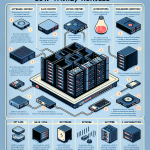What You Need to Know About Setting Up a Homelab
Over the years, I’ve found that the thrill of exploring technology can be as exhilarating as any adventure. My journey into the world of homelabs has been transformative, and I feel compelled to share this experience with you. A homelab is so much more than just a lineup of servers and cables; it represents a space brimming with exploration and personal growth. It’s a cozy corner where I can stretch my wings in the vast universe of IT—from the latest technologies to the hidden gems of the internet.
Why You Should Consider a Homelab
You might be sitting there wondering, “Is a homelab really for me?” After digging into this realm, I can assure you the answer is a resounding yes! Allow me to share some of the most enriching reasons to embark on this exciting journey:
- Skill Development: For anyone like me who’s serious about enhancing their technical prowess, a homelab presents an incredible opportunity. It’s the perfect ground for mastering server management, networking fundamentals, virtualization, cloud computing, and so much more. Each moment spent tinkering away contributes to a sturdy foundation, particularly if you are eyeing coveted certifications from CompTIA, Cisco, or AWS.
- Self-Hosting Capabilities: Imagine the joy of hosting your own applications! With a homelab, I can self-host everything from private cloud services like Nextcloud to media servers such as Plex or Jellyfin. Learning to control my own data while cutting costs has been immensely satisfying.
- Testing and Experimentation: I often find myself experimenting with new software in my homelab. This safe environment allows me to test configurations and applications without any fear of real-world repercussions. It’s the perfect playground for evaluating operating systems and security measures.
- Backup and Storage Solutions: Security is vital, especially when it comes to personal data. In my homelab, I’m able to create robust storage solutions using NAS devices like TrueNAS or Unraid, ensuring my cherished memories stay safe and easily accessible.
Essential Components of a Homelab
One of the most beautiful aspects of building a homelab is its customizability. Every homelab tells a unique story—shaped by budget, personal interests, and available space. Here are some typical components that you might want to consider incorporating:
- Servers: These are the heart of any homelab. Whether I’m choosing a diminutive Raspberry Pi or resurrecting an old desktop, the server selection is dictated by my intended projects.
- Networking Gear: Routers, switches, and firewalls are essential in creating a seamless network. Having the right tools enhances both performance and security while providing a sturdy foundation for whatever I choose to experiment with.
- Storage Solutions: I always prioritize an efficient storage system! Utilizing hard drives and NAS devices ensures I can keep my data organized while safeguarding against potential hardware mistakes.
- Virtualization Software: Programs like Proxmox, VMware, and Docker help me run multiple virtual machines on a single piece of hardware. Virtualization not only maximizes efficiency but also empowers me to take bold leaps with various projects.
Popular Homelab Use Cases
The possibilities with a homelab are truly endless! Throughout my journey, I’ve discovered various inspiring ways to utilize my setup. Here are some popular use cases that might resonate with you:
- Creating test environments for new software
- Designing a game server for fun with friends
- Implementing continuous integration and deployment for software projects
- Exploring cybersecurity techniques safely and without consequences
- Setting up a custom media streaming service to watch my favorite shows and movies
The Learning Experience
Hands down, one of the most rewarding facets of having a homelab is the learning experience. It’s a realm where I can fail and grow without fearing the aftermath. The thrill of overcoming a technical hiccup or mastering a configuration brings an unmatched sense of achievement! Each trial brings me closer to becoming the tech-savvy individual I aspire to be.
In addition to my personal growth, I’ve found that the homelab community is incredibly supportive. There’s a wealth of information available online, and I love tapping into it—be it forums or social media groups. For instance, the Homelab subreddit is a treasure trove where I can engage with fellow enthusiasts, share insights, and ask questions. The kindness and curiosity of this community inspire me every day!
Conclusion
As I reflect on my journey, it becomes abundantly clear that my homelab is more than just a project; it’s a thriving ecosystem that fosters learning, creativity, and personal growth. By starting your own homelab, you’re laying the groundwork for a world of possibilities. Each day offers a chance to dive deeper, experiment, and discover new technologies, all while enjoying the beautiful process of learning.
I would love to hear your thoughts on this! Have you started building your homelab, or are you contemplating taking the plunge? Please feel free to leave a comment below to share your insights, challenges, or any questions you might have. Happy labbing!



